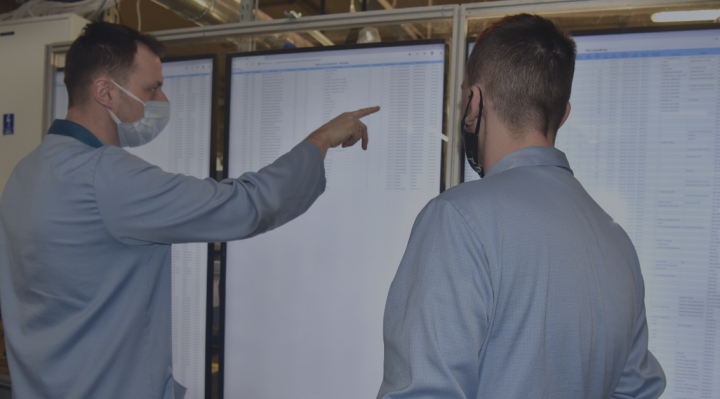Choosing a contract electronics manufacturing provider is a relatively long process, preceded by searching through Internet resources – websites, technical resources, as well as conversations with marketing and sales departments of potential counterparties. All these activities should be aimed at selecting up to a maximum of two or three EMS service providers with the most relevant profile. Next, it is worth conducting an audit before making the final decision. An EMS audit will allow you to directly assess each of the selected electronics manufacturing facilities as well as their capabilities.
As a contract electronics manufacturer operating in the market for many years, we ourselves have been audited numerous times, which is why we thought it would be useful to share the approach applied by many OEM manufacturers, while at the same time emphasizing the best practices for the Purchaser in this scope.
Questionnaire
It is best to precede a "physical" EMS audit with a questionnaire. After an initial selection of the potential contractors, many OEM manufacturers within their own quality departments prepare and send out a questionnaire to the suppliers, including questions regarding key issues for their own organization. With the right structure, the questionnaire becomes an effective tool for gathering key information, and since responses are usually returned in the same format, several providers can be compared quickly.
The questions asked by the OEMs typically cover areas such as:
● The company:
○ The size of the company
○ The employees:
■ The number of employees
■ Whether they have the training and in what area
○ Separate departments/units within the structure
○ Financial stability
● Production:
○ The technological processes
○ The machinery park
● The experience:
○ With regards to the above-mentioned technical processes
● The partners:
○ From which markets they come
● The certifications:
○ General questions, about possessing any certificates
○ An inquiry regarding possessing specific ones
● Control and quality:
○ The ways of ensuring the quality of the assembly process
○ A quality management system:
■ If there is any
■ The form of documentation
■ The frequency of reviews/updates
○ A process control system:
■ If there is any
■ When it is used
■ The procedures
■ Audit progress sheets
■ The engineering shift control system
● The suppliers:
○ How they are selected:
■ The criteria they must meet
■ The supplier evaluation system
● The information systems support
● Other:
○ More specific questions that are significant from the point of view of your company and from the point of view of a good working relationship with your contractual electronics supplier.
The visit
If the answers in the questionnaire meet your expectations, it is a good idea to visit the supplier's company and check, whether they are coincident with the reality. Do the particular processes really look as agreed, are the declared standards (e.g., the ESD, 5S) met; what the daily quality management looks like.
The contract electronics manufacturer should perform a brief overview of the company and give you a tour of the facility. This provides you with the opportunity to get to know the leaders of the different teams you will be working with later (e.g., the person who is responsible for the quality of the process). Your own EMS audit is also an opportunity to ask questions regarding previous audits – how they went, what the key findings were.
Suppose, for some reason (such as the ongoing pandemic), you are unable to conduct a visit. In that case, your contractor should propose a "virtual tour" of the production facility (at least partially) so that you can see the conditions and ask any questions concerning the process right away.
An implemented Business Continuity Management system
A good contract electronics manufacturer, in addition to ensuring ongoing seamless operations, anticipates potential risks. Therefore, you should also familiarize yourself with this planning aspect of the cooperation with your potential suppliers – how each of them manages business continuity, whether the policy adopted in this scope was created purely as an internal initiative or whether they also possess certifications such as, for example, ISO 22301.
Possessing a certificate is not enough. An EMS audit should also verify how the contractual electronics manufacturer anticipates possible risks and whether they implement solutions to prevent their consequences on an ongoing basis (e.g., by conducting analysis of previous errors and implementing improvements into the process). Once adopted, the system should be improved continuously. Here, a combination of competencies and (desirably) years of experience becomes apparent, thus helping your business to grow and avoid possible crises.
Quality control
A good contract electronics manufacturer conducts a number of checks, tests, and inspections on their products. It is worth knowing in advance what type of quality control is carried out, whether specific employees are responsible for particular verification activities, and whether the inspection is carried out on each individual product or only on a sample.
It is equally as important what type of inspection and measurement equipment the contractual electronics manufacturer possesses. This will also partially answer the question of whether a given EMS is capable of constructing a tester strictly for the customer’s products. This way, a dedicated tester will accurately verify all the parameters that are crucial to you. Working with a counterparty with significant experience in conducting a wide range of tests, implementing custom solutions, and documentation control guarantees eliminating as many product defects as possible before they become a major problem or reach the market with poor quality.
Advanced product quality planning
When auditing an EMS’s factory, it is worth asking for samples of the manufacturing process. This way, you can see the quality of the assembly, check whether it meets the initial assumptions and standards. It is also an opportunity to see if the contractual electronics manufacturer uses protection against ESD as well as where the assembled products are stored.
It is also worth checking how a contractual electronics manufacturer approaches new product introductions (NPI) – i.e., whether they use Advanced Product Quality Planning (APQP), or its equivalent, as part of their NPI process. It is also worth specifying how the EMS controls their deadlines and tasks within the implementation process, whether they conduct failure modes and effects analysis (FMEA), whether they use quality control plans, and whether they share with the client any observations from the implementation of the new product, which may also help in its improvement and the improvement of its manufacturing process.






